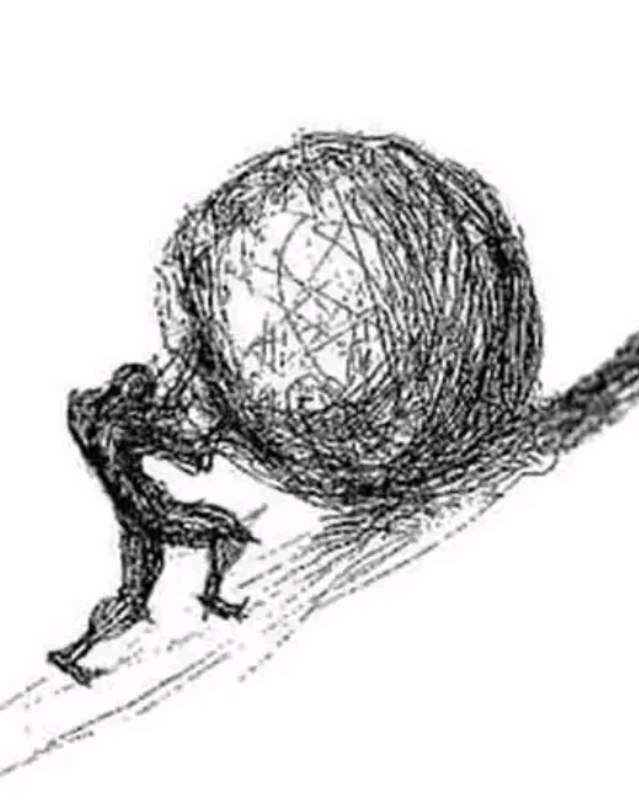cross-posted from: https://hexbear.net/post/2858492
I think I understand the simple model of base and superstructure (but that was Gramsci’s model)
The simple use of quantitative to qualitative change, and vice versa
The simple fact that contradictions can exist in a society, manifesting in the form of problems, which are symptoms of its economic systems…
I don’t think its about thesis + anti-thesis -> synthesis.
I think its about one economic class, like capitalist to feudal lord, dominating over one class, and absorbing its birthmark attributes, before surpassing its birthmarks overall…
Or as if a capitalist upon its created proletariat, not only ruling over them, but co-opting or destroying any of its measures
To me, its about who the ruling most HEGEMONIC class is, and how it operates…
Other than that, I don’t know how else to apply it, let alone know if its somewhat broadly accurate…
Correct me if I’m wrong, if not elaborate on what ye mean?
It’s the curse of being a leftist. I walk past a coffee shop and think about how there are no third spaces left to hang out for free. Because they were systematically destroyed, in order to separate the people into individuals, and at the same time commodify their leisure at ever growing costs. How there are so many people working miserable jobs in those coffee shops, jobs that we don’t need in the first place. About the chains that have swallowed all the individual businesses that could’ve been of higher quality, had better working conditions and pay. About the bench outside with extra railings, so that the unhoused people couldn’t sleep on it. They’re forced to sleep in designated “bad hoods”, from where they will eventually be kicked out by
pigsfilth so that their hoods can be gentrified. And all those freshly gentrified hoods will have tons of empty condos that would never house even one of those displaced people…Then I smoke a joint, watch some cute animal videos, and forget about it until the next time I walk past a coffee shop.
Not sure why people call cops “pigs” when pigs are cuties
Actually, hard agree. Can we make filth a thing instead?
Pigs also have emotional intelligence. Unlike cops.
I start at the premise that any change anywhere brings change somewhere else, and you have to be mindful of that all the time.
Then I recommend the GOAT Elementary Principles of Philosophy
and after that I’ll write the rest later lol
Tysm…
I highly recommend Mao’s essay On Contradiction: https://www.marxists.org/reference/archive/mao/selected-works/volume-1/mswv1_17.htm
I’ve been trying to revisit it more than once until it crystallizes in application. I can try to give an example of how I apply what I think is roughly dialectical thinking beyond purely basic class stuff. It’s something I thought through a while ago, but I’ve never formally written down my reasoning and observations, so bear with me.
In text generation AI, I encountered a problem. I’m making a long story short, but I found there were companies, one in particular that I experienced directly, who provided an AI-powered chat service to help people with emotional support and loneliness (that was in part how it was advertised and scripted). However, this service also pulled the rug on people at some point and caused a lot of damage.
This drove me to ultimately seek out and support a lesser known (at least at the time) AI service that was staunch on user privacy (using encryption to accomplish it) and being uncensored text (you can write anything in private with it). Within this, I had to contend with the fact that I am not someone who blanketly goes “free speech”; I am not someone who thinks people should just be able to do whatever no matter the circumstances. I also had to contend with the fact that I am not a blanket supporter of AI, considering its implications for messing with the jobs of working class people. Even more complicated, this was (still is) an AI service that also allows image generation (though that aspect of it is not something where you can generate anything - you can’t generate “lifelike” due to how the model is trained) and image generation arguably poses more of a threat to jobs than text generation, since it creates an image start to finish without needing an artist in the process at all. Furthermore, this was the main source of funding for that company (they don’t take money from outside investors).
But, this was also the only AI service taking seriously the consequences of dealing with emotionally vulnerable people who are saying private and sensitive things to an AI. In order to side with these people and side with them having a harm reduction place to cope with the loneliness and abandonment capitalist life has inflicted on so many, I am also siding in some part with the development of AI and the proliferation of it and consequences intersecting with it and capitalism devaluation of labor, even if I try to have conscious limits on how I partake in that and in what way.
So, my “support” of AI in this understanding is conditional and developing, based on how it intersects with what regular people are dealing with and the consequences it has, helpful or unhelpful. It also contains a certain amount of contradiction, in the sense that I am arguably allying with people I’d rather not be, to an extent, in order to reduce harm for the time being and support development of AI in a direction that is genuinely safer (not “safer” in the corporate PR meaning). I am not capitulating on caring about regular people in the process, but I am having to choose where I put my energies in the direction of substantively helping them. I don’t pretend it is a challenge or threat to the capitalist order, something like this, but it is something where I tried to really go through it and work out what was the best course of action while keeping the ideological core intact. There was/is, as far as I could discern, no “right answer” in a binary meaning of it. Instead, I was trying to work out where in the contradictions of it made the most sense to take action to enact my intent to side with regular people and what form that action would take.
I am not very confident on the subject and practice of dialectical materialism, so please don’t take this as a model of it. But hopefully it can provide some food for thought, if nothing else.
Tysm…
To be completely honest: I don’t
Good question. But very broad! Sounds like you’ve got the essentials sorted. What do mean by ‘broader analysis of society’? If you give me something a little more specific I might be able to run through an analysis with you to show you how I’d do it. (Depending on the topic!) I could give you some quotes relating to what I interpret as ‘broader … society’ but it’ll be very abstract.
Interest rates? That’s a topic…
Sorry for the delay. You picked a difficult topic. I’ve been thinking about how to tackle it. I’ll see what I can do. I say something like the following in some conversations now and again. Dialectics gives me a broader perspective and helps me to explain why things are the way they are.
Interest rates increase and house prices decrease while monthly mortgage payments shoot up. Imagine you agreed to a mortgage to buy a house at 3% interest. Your fixed rate agreement comes to an end.
The central bank puts up interest rates to 4%. The bank, in turn, adds this to it’s standard mortgage rate of e.g. 3.9%. Now your interest goes from 3% to 7.9% (4%+3.9%). Your monthly payment grows from $700 to $1200. Interest is the same as rent. If you have a mortgage, the bank is your landlord. The law obscures this relationship.
You could afford $700 but you can’t afford $1200. You decide to sell and buy something cheaper. Unfortunately, you’re among thousands of others doing the same thing. Every property under $300k gets sold rapidly. You either put an offer in on the day that is advertised or someone else will. Properties priced under $300k increase towards that limit.
Others can afford the properties between $300k and $450k. They sell their house, take the equity, and add it to what they can borrow. The bank says it will lend $250k. A year before, it would have lent $300k. Fewer people can afford the properties nearer to $450k. The sellers lower the price. Again, towards the $300k mark.
The composition of the housing market and homeowners changes. The poorest of those who can afford to ‘own’ their home are forced to spend more on the privilege. They have less money to spend on consumables. Moneylenders, however, are making the same or more than before on mortgages, even though they are lending less.
But it’s uneven and contradictory. The poorer consumers stop spending so much at the coffee shop, pub, and takeaway. They spend less on clothes. These shops, etc, lose income. They can’t pay off their credit card debt. Some close down. They stop paying the rent on their commercial property. Some landlords default on their commercial mortgages. The banks lose some income.
To stay open, the remaining shops raise their prices to cover the increase in their own rent or mortgage. Customers (the same people in the verge of repossession proceedings) pay the difference. The bank is now lending money to fewer businesses, but it’s income stays the same or increases because those who continue to pay, pay more.
The customers in the coffee shop now expects a lot more. They’re paying $8 for a coffee, they feel entitled to the best service and less inclined to tip. They fight each other for a table and chair in the restaurant. Animosity prevails. The customer-workers struggle against each other and the barista. Social life just became a lot more alienated. Try building solidarity among this lot.
To get any income back that the bank does lose from defaults, they raise interest rates, further driving the cycle of impoverishing the workers and enriching/impoverishing the moneylenders. But whereas the banks win and lose, the workers only lose. Some cannot afford to move or remortgage. They default and their home is repossessed. The bank sells it and recoups it’s loan (most of the time – but things were especially uneven after the 2008 financial crash). If it can’t and goes bankrupt, the state bails out the bank.
When the state hands out money to banks, or like during COVID, people begin to spend more (there is more money on circulation) it will later raise interest rates to slow down spending. But when interest rates increase and spending slows down, the above cycle starts again.
The bank and the customer are dialectically related. The bank doesn’t exist without the customer. In late capitalism, the customer can’t exist without a bank account and some form of borrowing (even if it’s just the promise of an unarranged overdraft). But the bank is constantly trying to take everything from the customer. It is their reason for existing. The bank is the face of the imperialist, the customer of the worker.
Interest rates, as a relation, are a mechanism of and they reveal the transfer of wealth from poor to rich. Anything not taken by your employer is in one way or another taken by the bank. You can’t see this without dialectics; you feel the pinch, you see the holes in your shoes, but you don’t make the connection.
And some of what your employer takes from you, is only taken because they themselves have to pay the bank or they have to pay suppliers who also need to charge more because they are owned by the bank.
By unfolding interest rates as a relation, rather than as a simple number that goes up and down linearly, we can see that it is a microcosm of capitalism.
deleted by creator
Mostly with niche topics like late stage media, whether or not gen alpha is cooked (answer is yes), overaestheticization. As for political topics the only major thing I did is explain why the proles need a monopoly on violence to defend against counter-revolution.





